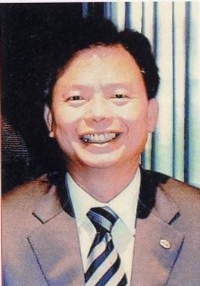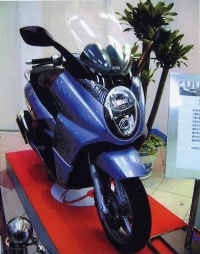Sanyang Opens New R&D Center, Aims at Top Ten in PTW Sales
Jul 08, 2004 Ι Supplier News Ι Powersports Ι By Quincy, CENS
(From left), Sanyang chairman Huang Hsih-huei, President Chen Shui-bian, and Vice Economics Ministry Lin Hsin-yi admire the company`s new RVI80 EFI scooter.
At the opening ceremony, which was attended by a large group of dignitaries including President Chen Shui-bian and Vice Premier Lin Hsin-yi, the company introduced past R&D achievements including the world's first scooter with electronic fuel injection--the RV180 EFI--and a prototype 500cc scooter with an EFI liquid-cooled engine.
Sanyang's chairman, Huang Shih-huei, said that his company fully realizes the vital importance of establishing its own R&D capability if it is to survive the increasingly fierce competition in the domestic market following Taiwan's entry into the World Trade Organization at the beginning of 2002. To further upgrade its market strength, the chairman added, Sanyang will work harder to set up cooperative ties with international partners.
The new R&D center is located in the company's factory complex in the county of Hsinchu, northern Taiwan. The R&D team laboring there totals over 350 professionals (with a planned increase to more than 500 in 2004) and has an annual budget of NT$600 million (US$17.65 million) for new-model development.
The firm's president, Huang Kuang-wu, commented at the event that the new R&D facility would be a global technical center for the development of core PTW technologies, and would provide help to Sanyang's subsidiary in Vietnam, the Vietnam Manufacturing Export Processing Co., in developing into the company's global design center for commercial PTW models.
Sanyang has set up two other subsidiaries in Vietnam to help upgrade the technical level of its operations there and meet the Vietnamese government's local-content requirements. The two new companies produce molds, dies, and PTW parts. In the future, the Vietnamese ventures will help the Taiwan R&D center in developing models that cater to different regional markets.
Auto Line to be Expanded
Another Sanyang official said that the new R&D center will gradually expand its design and development capability to include automobile-related products. Vice Premier Lin suggested that the company also utilize the advanced software and hardware in the government-backed Automotive Research & Testing Center so as to catch up with its rivals more quickly.
In addition to PTWs, Sanyang also assembles Hyundai cars in Taiwan and aims to sell about 25,000 units of the four-wheelers next year. This would be an improvement over results to date--fierce competition has kept sales growth at a moderate level. Sanyang officials have said that they need an annual production of 25,000 units before they can realize economies of scale.
At the opening ceremony, President Chen praised Sanyang as Taiwan's first PTW maker to export whole-plant equipment to its overseas subsidiaries, and the first to set up an independent R&D center on the island. This addition, he said, turns Sanyang into a comprehensive company with R&D, design, manufacturing, international marketing, and global logistics capabilities.
"Sanyang has weathered its toughest time," president Huang said, "but now we look forward to constant profit growth in the years ahead." The firm has been buffeted by severe financial woes over the past two years because of unsuccessful investments at home and overseas, as well as the break-up of relations with its long-term Japanese auto-making partner, Honda, and sluggish PTW sales.
The company's short-term goal, Huang announced, is to become one of the world's top 10 PTW makers by 2007 with an annual production of 1.5 million units at plants in Taiwan, mainland China, and Vietnam. After consolidating its foothold in the international PTW market, the company plans to further boost its auto production by introducing more new models for local assembly.
Huang took over the helm of Sanyang during its most difficult time, in April 2002, and returned it to profitability early this year. Pretax earnings in the first three quarters of 2003 amounted to about NT$300 million (US$8.8 million), making it likely that the full-year target of NT$308 million (US$9 million) will be achieved.
Record Projection
The company projects record sales of 530,000 PTWs this year, including 270,000 Taiwan-made units (240,000 at home, 30,000 exported), 200,000 Vietnamese-made units, and about 60,000 units made by mainland Chinese subsidiary Xiashing Motorcycle Co.
In the area of cars, Sanyang expects to sell about 10,000 locally made Hyundais this year.
To achieve its top-10 goal, Huang said, the company will have to achieve an annual production volume of 300,000 units in Taiwan, 500,000 in mainland China, and 700,000 in ASEAN nations. To achieve this volume, it plans to set up new plants in the Philippines and Indonesia.
In Taiwan, Huang stated, the company will devote its efforts to the development of high-added-value and large-engine PTW models designed to capture more of the international market. Next year, it plans to introduce 250cc and 500cc scooter models.
In the mainland, where more than 10 million PTWs are now sold every year, the firm's subsidiary will strive to develop the right models for that market and tag them with reasonable prices.
In Vietnam, Sanyang's subsidiary company will develop capacity at its two plants-one each in the south and north of the country-to a maximum level. The Vietnamese company will also be used to establish the planned plants in the Philippines and Indonesia.
Overseas sales will become more and more important, as the PTW market in Taiwan is shrinking. The island's fourth-stage emission regulations will become effective at the beginning of 2004, forcing a halt to all production of relatively cheap two-stroke models. Many riders, knowing this, have bought new scooters in 2003; as a result, PTW production is expected to drop from this year's projected 750,000 units to only around 650,000.
Sanyang expects its own PTW sales in Taiwan to drop to 220,000 units in 2004, down from about 240,000 in 2003. At the same time, however, the firm's exports from the island are expected to grow from around 30,000 units in 2003 to between 40,000 and 50,000 units.
Huang projects sales of about 220,000 units in Vietnam and 120,000 units in China in 2003.
©1995-2006 Copyright China Economic News Service All Rights Reserved.








